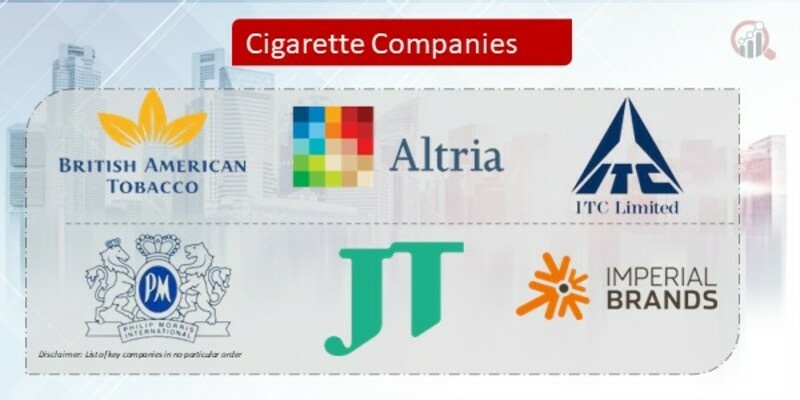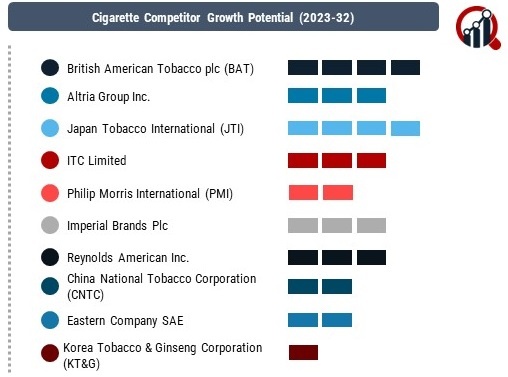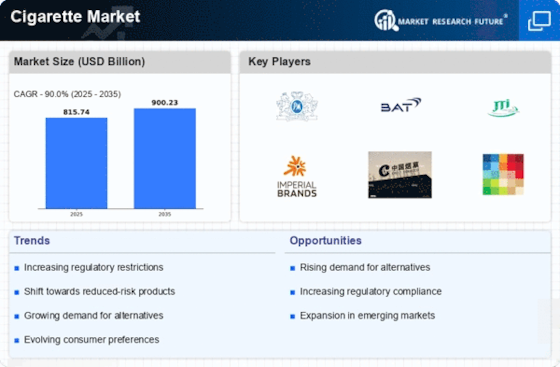Top Industry Leaders in the Cigarette Market

Market share analysis in the competitive cigarette landscape is influenced by various factors, with price, product quality, and brand loyalty standing out as pivotal determinants. Additionally, regulatory compliance and corporate responsibility initiatives play an increasingly significant role in shaping consumer perceptions and, consequently, market share. The dynamic nature of consumer preferences, influenced by factors such as health consciousness and changing social norms, also contributes to the fluidity of market share distribution. Companies meticulously analyze these variables to fine-tune their marketing and product development strategies, aiming to resonate with evolving consumer demands.
In recent years, the cigarette market has witnessed the emergence of new and innovative companies seeking to disrupt traditional norms. Start-ups and smaller players are exploring niches such as electronic cigarettes, smokeless alternatives, and sustainable tobacco products. These entrants often employ digital marketing channels and agile business models, capitalizing on the perceived shift towards reduced-risk options. The industry has taken note of these newcomers, prompting established players to recalibrate their strategies to stay abreast of changing market dynamics and capitalize on emerging opportunities.
Industry news within the competitive cigarette market reflects a broader narrative of regulatory developments, evolving consumer preferences, and corporate responses to societal trends. Regulatory scrutiny, particularly regarding advertising restrictions, packaging regulations, and health warnings, continues to shape the industry's operating environment. Furthermore, news surrounding reduced-risk products, technological advancements in smoking alternatives, and sustainability initiatives gain prominence as companies navigate the delicate balance between compliance and innovation. Mergers and acquisitions also feature prominently, with companies strategically aligning to consolidate market share, diversify product portfolios, and strengthen their competitive positions.
The current investment trends in the cigarette industry underline a dual focus on traditional tobacco products and the exploration of reduced-risk alternatives. Established players are allocating significant resources to research and development, aiming to bring innovative products to market that align with evolving consumer preferences. Simultaneously, investments in marketing campaigns, especially those emphasizing reduced harm and sustainability, reflect a proactive response to societal shifts and regulatory imperatives. Furthermore, companies are investing in strategic partnerships and collaborations to enhance their technological capabilities and gain a competitive edge in the dynamic market landscape.
The overall competitive scenario in the cigarette market remains robust, driven by a delicate interplay of regulatory dynamics, consumer behavior, and corporate strategies. As established players navigate challenges posed by declining cigarette consumption, they actively seek avenues for growth through diversification, innovation, and international expansion. New and emerging companies, leveraging digital platforms and catering to evolving consumer preferences, inject a sense of dynamism into the market. The industry's future trajectory will be shaped by its ability to balance tradition with innovation, navigate regulatory complexities, and respond effectively to the evolving expectations of consumers in an era marked by heightened health consciousness and sustainability concerns.
Industry News and Investment Landscape:
- Consolidation trends are evident in recent mergers and acquisitions, such as PMI's acquisition of Swedish Match, as investors look to diversify their holdings.
- The shifting dynamics of the market are reflected in the rise in research on harm reduction technology and alternative nicotine products.
- Market dynamics are being impacted by regulatory changes, such as tax increases and taste bans, which are causing players to modify their tactics.
Key Companies in the Cigarette Market Include –
- British American Tobacco plc (BAT)
- Altria Group Inc.
- Japan Tobacco International (JTI)
- ITC Limited
- Philip Morris International (PMI)
- Imperial Brands Plc
- Reynolds American Inc.
- China National Tobacco Corporation (CNTC)
- Eastern Company SAE
- Korea Tobacco & Ginseng Corporation (KT&G)











